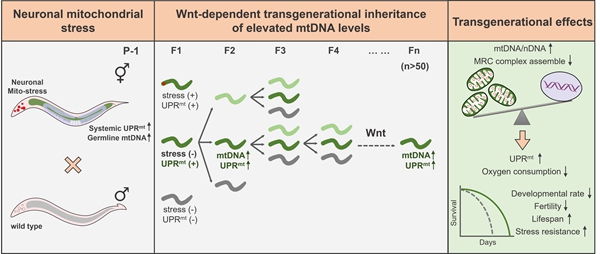-
The Memory of Neuronal Mitochondrial Stress is Passed on to Their Descendants
TIME: 03 Aug 2021The impact of the parental experiences has been observed to extend over multiple generations in various organisms. It is therefore of significant scientific interest to determine what environmental and physical conditions could induce transgenerational effects.In a cover study of Nature Cell Biology, Dr. TIAN Ye's group from the Institute of Genetics and Developmental Biology, the Chinese Academy of Sciences, revealed that neuronal mitochondrial stress can be sensed and reacted to by the mitochondria in the germline to potentially promote the maternal inheritance of elevated mtDNA levels across many generations in a Wnt signaling-dependent manner. This study entitled “The memory of neuronal mitochondrial stress is inherited transgenerationally via elevated mtDNA levels” has been published on August 2.In this study, the authors described a discovery stemmed from a serendipitous observation that neuronal mitochondrial stresses elicit a global induction of the UPRmt that can be transmitted to offspring for multiple generations (>50) in Caenorhabditis elegans even after the original stress signal has been gone. The transgenerational induction of UPRmt was caused by the elevated mtDNA inherited maternally, which disturbed the balance between mitochondrial oxidative phosphorylation subunits encoded by the mtDNA and the nuclear DNA to induce mitochondrial proteostasis stress. Wnt signaling is required for the propagation of elevated mtDNA levels across generations via transgenerational regulation of the mtDNA polymerase polg-1.The transgenerational inheritance of the elevated mtDNA levels and the UPRmt enable their descendants to live longer and confer increased stress tolerance. However, there is clearly a cost of transgenerational UPRmt, animals with these transgenerational effects take a longer time to sexually mature and will produce less progeny. The presence of such a trade-off implies a fitness cost of inheritance of elevated mtDNA levels if stress conditions are not experienced in the near future. Model for the transgenerational inheritance of increased mtDNA levels and the UPRmt. (Image by IGDB)Contact:Dr. TIAN YeInstitute of Genetics and Developmental Biology, the Chinese Academy of Sciences
Model for the transgenerational inheritance of increased mtDNA levels and the UPRmt. (Image by IGDB)Contact:Dr. TIAN YeInstitute of Genetics and Developmental Biology, the Chinese Academy of SciencesEmail: ytian@genetics.ac.cn
 CAS
CAS
 中文
中文




.png)
